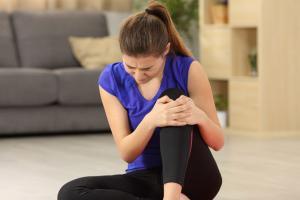The knee is vulnerable as it bears a great deal of stress resulting from everyday activities, like lifting and kneeling, and from high-impact activities, such as jogging and aerobics

Knees are one of the strongest and most vital joints in the human body. They allow one’s lower legs to move relative to thighs and support the body’s weight. Movements at the knee joint are crucial for daily activities. The knee is vulnerable as it bears a great deal of stress resulting from everyday activities, like lifting and kneeling, and from high-impact activities, such as jogging and aerobics. One may suffer from knee problems due to an injury, sudden or repetitive, and due to certain diseases like Gout and Rheumatoid Arthritis. Even otherwise one may encounter knee problems just due to the ageing process and continual wear-and-tear of the knee (arthritis).
ADVERTISEMENT
Knee pain, a growing matter of concern
In India, four in ten patients visiting a 'bone and joint clinic' have knee pain. Around 90 per cent of the population over 60 years has some degree of osteoarthritis. And around a third of people aged 45 years and over seeking treatment. To put matters in perspective, the incidence of cataract is almost the same, albeit cataract-related blindness is more prevalent, disabling and hence treated fervently.
Osteoarthritis of the knee is the leading cause of pain and disability in most countries worldwide. That said, the Asian subcontinent has seen a surge of ‘knee replacement seeking’ patients in the last decade. We are looking at an Arthritis epidemic. The incidence is believed to be 15 times higher than what is found in Western nations. The USA with a population of 30 crores saw 10 lakh knee replacements last year. India has a population of 130 crores (four times more)! Can you imagine the demand we are going to see in the coming years?
So why are Indian knees failing early and more often than not? Dr. Miten Sheth Orthopaedic Knee Surgeon, The Knee Clinic, Mumbai has answers.
From a philosophical standpoint, it seems God has given Indians have better brains, liberal libido, happier hips and creaking-cracking knees. Furthermore, our 'desi' culture and habits do us no favours. Squatting (for a dump or otherwise), practising yoga poses like Malasana, Vajrasana, Surya Namaskar and perfecting Bharata Natyam postures like Araimandi are part of core Indian values. In general, they are great for the mind, body and soul. But scientific research suggests that activities involving complete knee bending and weight-bearing at the same time are detrimental to the joint's longevity.
Also Read: Suresh Raina: Second knee surgery was a tough call to make
Obesity can be the culprit
India is growing fatter by the day. We have the second-highest number of obese children in the world. Weight increases pressure on all the joints, especially your knees. Every kilo one gains add 3-4 kilos of extra weight on the knees. So, if a person is 10 kilos overweight, that is 40 kilos of extra pressure on the knees. Also, once a person has arthritis the additional weight causes even more problems on already damaged joints. Unless we change our diet and lifestyle, Obesity is here to stay and so is Osteoarthritis!
Indian knees age faster than Westerners
Osteoarthritis is part and parcel of ageing. Faces wrinkle, hair grows white, eyes develop cataracts and knees get arthritic. Unfortunately, Indians age faster than people living in Japan or Switzerland. The Lancet Public Health published this fact and many newspapers reported it in March this year. People living in India experience health problems associated with ageing (including Osteoarthritis) at an early stage than most Westerners.
Take-home message: As we look forward, we are staring at a demographic time bomb - an ageing Indian population with inescapable, ubiquitous arthritis. With a shortage of healthcare infrastructure and Orthopaedic specialists, it will be difficult to cope with this huge healthcare burden. Nonetheless, we have skilful surgeons, fast-growing indigenous technology. The optimism reminds me of a Helen Keller quote "Although the world is full of suffering, it is also full of the overcoming of it."
Catch up on all the latest Crime, National, International and Hatke news here. Also download the new mid-day Android and iOS apps to get latest updates
The content is not intended to be a substitute for professional medical advice, diagnosis, or treatment. Always seek the advice of your physician or other qualified health providers with any questions you may have regarding a medical condition.
 Subscribe today by clicking the link and stay updated with the latest news!" Click here!
Subscribe today by clicking the link and stay updated with the latest news!" Click here!






